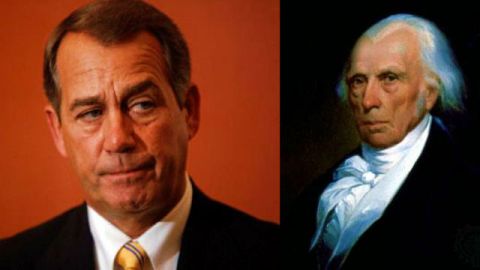Our Founding Fathers Never Imagined Congress Would Behave This Badly

“One faction of one party in one house of Congress,” President Obama said on Monday, “doesn’t get to shut down the entire government just to refight the results of an election…You don’t get to extract a ransom for doing your job, for doing what you’re supposed to be doing anyway, or just because there’s a law there that you don’t like.”
James Madison, an author of the Federalist Papersand theorist of how factions develop and can be prevented in democratic republics, would certainly agree.
More on that theme in a minute. First we have to clear up one thing about repeated Republican claims that they have the American people on their side in forcing a government shutdown. The Affordable Care Act, while hardly wildly popular, is not hugely unpopular either. Now I’m not sure how valuable it is to divine American public opinion on a law that hasn’t yet fully come into effect, but never mind that. The decisive matter is not whether 43% of 47% or 51% of Americans have some objections to Obamacare in the weeks before its central provisions are launched: clearly many are wary of it. The question is whether a solid majority of the public would prefer to sabotage Obamacare than keep the federal government running. On this question, the data is clear: 72% of American voters oppose last night’s shutdown of the government to undermine the Affordable Care Act, while only 22% support it.
So it is disingenuous to claim, as does John Culberson, a Republican legislator from Texas, that “constitutional conservatives in the House are keeping their word to our constituents and our nation to…protect them from the most unpopular law ever passed in the history of the country.” This is grandstanding, pure and simple. Even if shutting down the government were a legitimate political tactic (more on that in a moment), there is no mandate from the American people to shutter the government in order to prevent the implementation of the Affordable Care Act.
President Obama is right. John Boehner and company are a faction in the sinister sense of the term as it was understood by the Founding Fathers. Here is James Madison with the definition, from Federalist #10:
[A] number of citizens, whether amounting to a majority or a minority of the whole, who are united and actuated by some common impulse of passion, or of interest, adversed to the rights of other citizens, or to the permanent and aggregate interests of the community.
It’s relatively easy to avert disaster when the faction is in the minority, Madison wrote: “relief is supplied by the republican principle, which enables the majority to defeat its sinister views by regular vote.” The real challenge comes when more than half of the country shares a view inimical to the interests of a part or the whole. Majority factions, wielding the “tyranny of the majority” are a tougher nut to crack. But the structure of the American government, Madison argued, will help prevent majority factions from ever arising. With the “the greater number of citizens, and greater sphere of country” in a large republic, it is less likely that bad seeds will find each other to rally around a dangerous idea. And with “the delegation of the government, in the latter, to a small number of citizens elected by the rest,” we will send judicious souls to the national legislature to make enlightened decisions for the rest of us:
[Members of Congress], whose wisdom may best discern the true interest of their country, and whose patriotism and love of justice will be least likely to sacrifice it to temporary or partial considerations. Under such a regulation, it may well happen that the public voice, pronounced by the representatives of the people, will be more consonant to the public good than if pronounced by the people themselves, convened for the purpose.
Madison’s analysis of the American republic is often praised for its brilliance, but the 4th president could not have envisioned the chutzpah and anti-government zeal of the 2013 House Republicans. By now it should be apparent that everything in the previous paragraph is backwards as it applies to the shutdown battle. The road to the shutdown was not a result of a majority faction oppressing the rest of us. It was a minority faction of Tea Party and Tea-Party-beholden members of the GOP refusing to recognize a duly passed, signed, enacted and Supreme-Court sanctioned law expanding health benefits for millions of Americans.
Unfortunately, as long as the Speaker of the House refuses to let his colleagues vote on a clean spending bill free of sabotage provisions (a vote that would pass with the support of Democrats and moderate Republicans) there is no way to simply vote down the Obamacare objectors and enact a budget the way Madison suggests. And it is Madison’s very solution to the problem of majority factions—tempering the people’s turbulent passions by turning decisions over to elected representatives in a calm, reflective deliberative body—that is actually the cause of the trouble. Wise, patriotic, reasonable, justice-loving members of Congress are in short enough supply in Washington, D.C. that they have thwarted the operation of the very institutions they took an oath to uphold.





